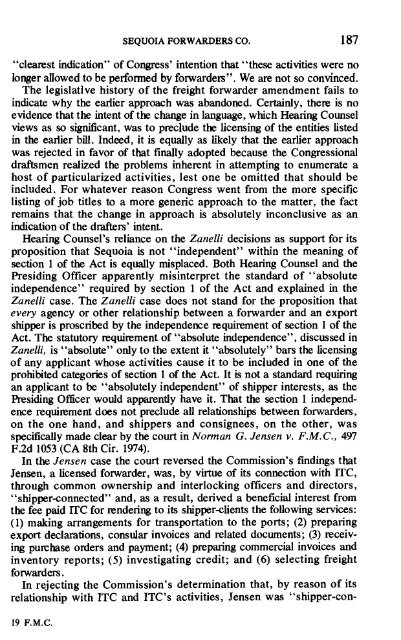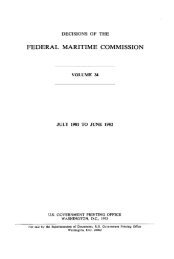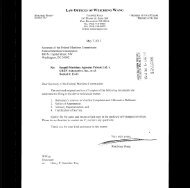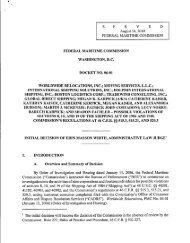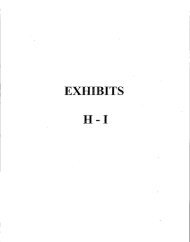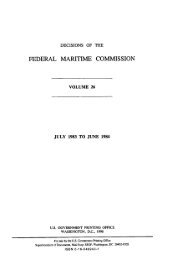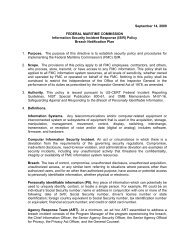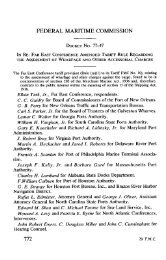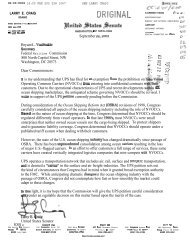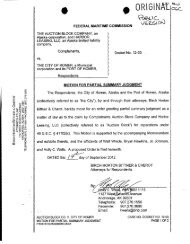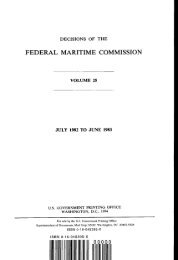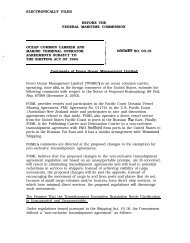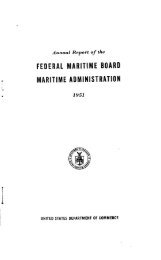- Page 1:
DOTFMCVPIFsbtoDUSGPDC2
- Page 4:
TPvVLhn4AN59PCE2AN81AtN93a95nT5ANT1
- Page 8:
TIPSIvn6SLSIUNUIVn7SLSIWICvnSASCvn4
- Page 12:
75727575787171717273737474757171717
- Page 15 and 16:
XVI FEDERAL MARITIME COMMISSION Ale
- Page 18:
TLIDN74n6KLI1F3n4KLI1F4n8F3nDN75MFC
- Page 22 and 23:
FEDERAL MARITIME COMMISSION INFORMA
- Page 24 and 25:
UNIROYAL INC v HAPAG LLOYD AG invol
- Page 26 and 27:
IMPOSING ALTERING CURRENCY ADJUSTME
- Page 28 and 29:
IMPOSING ALTERING CURRENCY ADJUSTME
- Page 30 and 31:
FEDERAL MARITIME COMMISSION INFORMA
- Page 32 and 33:
ROHM HAAS CO v VENEZUELAN LINE 11 R
- Page 34 and 35:
TITLE 46 SHIPPING Chapter IV Federa
- Page 36 and 37:
REGULATIONSUNFAVORABLE TO SHIPPING
- Page 38 and 39:
AIRLEX SHIPPING AlC v LYKES BROS at
- Page 40 and 41:
AIRLEXSHIPPING NC v LYKES BROS 19 T
- Page 42 and 43:
FEDERAL MARITIME COMMISSION SPECIAL
- Page 44 and 45:
Application FEDERAL MARITIME COMMIS
- Page 46 and 47:
TITLE 46 SHIPPING Chapter IV Federa
- Page 48 and 49:
TRUCK DETENTION PORT OFN Y While we
- Page 50 and 51:
TRUCK DETENTION PORTOFN Y begins wh
- Page 52 and 53:
TRUCK DETENTION PORT OF N Y 31 when
- Page 54 and 55:
TRUCK DETENTION PORT OFN Y 33 sugge
- Page 56 and 57:
TRUCK DETENTION PORT OF N Y 35 appo
- Page 58 and 59:
TRUCK DETENTION PORT OFN Y 37 gate
- Page 60 and 61:
TRUCK DETENTION PORTOFN Y 39 551 7b
- Page 62 and 63:
TRUCKDETENTION PORT OFN Y 41 Sectio
- Page 64 and 65:
FEDERAL MARITIME COMMISSION No 7414
- Page 66 and 67:
CHARGING HIGHER RATES THAN TARIFF 4
- Page 68 and 69:
CHARGING HIGHER RATES THAN TARIFF 4
- Page 70 and 71:
CHARGING HIGHER RATES THAN TARIFF 4
- Page 72 and 73:
CHARGING HIGHER RATES THAN TARIFF T
- Page 74 and 75:
CHARGING HIGHER RATES THAN TARIFF 5
- Page 76 and 77:
CHARGING HIGHER RATES THAN TARIFF 5
- Page 78 and 79:
CHARGING HIGHER RATES THAN TARIFF a
- Page 80 and 81:
KONWALCO v ORIENT OVERSEAS LINE und
- Page 82 and 83:
Reparation awarded FEDERAL MARITIME
- Page 84 and 85:
KONWAL CO v ORIENTOVERSEAS LINE pay
- Page 86 and 87:
FEDERAL MARITIME COMMISSION SPECIAL
- Page 88 and 89:
FEDERAL MARITIME COMMISSION SPECIAL
- Page 90 and 91:
19 F M C FEDERAL MARITIME COMMISSIO
- Page 92 and 93:
AGREEMENT NOS T I685 T I685 6 T 313
- Page 94 and 95:
AGREEMENT NOS T 1685 T 1685 6 T 313
- Page 96 and 97:
AGREEMENT NOS T I685 T 168 T 3130 a
- Page 98 and 99:
AGREEMENT NOS T 1685 T 1685 6 T 313
- Page 100 and 101:
AGREEMENT NOS T I685 T 1685 6 T 313
- Page 102 and 103:
AGREEMENT NOS T 1685 T 1685 6 T 313
- Page 104 and 105:
FEDERAL MARITIME COMMISSION DOCKET
- Page 106 and 107:
FEDERAL MARITIME COMMISSION INFORMA
- Page 108 and 109:
UNION CARBIDE INTER AMERICA v VENEZ
- Page 110 and 111:
FEDERAL MARITIME COMMISSION SPECIAL
- Page 112 and 113:
HOMASOTE CO v U S LINES The Commiss
- Page 114 and 115:
19 F MC FEDERAL MARITIME COMMISSION
- Page 116 and 117:
UNION ENGINEERING KUWAIT v IRAN EXP
- Page 118 and 119:
FEDERAL MARITIME COMMISSION No 75 5
- Page 120 and 121:
UNION CARBIDE INTER AMERICA v VENEZ
- Page 122 and 123:
CUMMINS ENGINE CO v U S LINES 101 e
- Page 124 and 125:
CUMMINS ENGINE CO v U S LINES 103 f
- Page 126 and 127:
FEDERAL MARITIME COMMISSION No 7517
- Page 128 and 129:
CLETO HERNANDEZ R D B A PAN INTER 1
- Page 130 and 131:
CLETO HERNANDEZ R D B A PAN INTER 1
- Page 132 and 133:
CLETO HERNANDEZ R D B A PAN INTER 1
- Page 134 and 135:
WINDJAMMER CRUISES INC LTD 113 requ
- Page 136 and 137:
WINDJAMMER CRUISES INC LTD 115 Legi
- Page 138 and 139:
WINDJAMMER CRUISES INC LTD 117 Flor
- Page 140 and 141:
WINDJAMMER CRUISES INC LTD 119 tele
- Page 142 and 143:
WINDJAMMER CRUISES INC LTD 121 In a
- Page 144 and 145:
WINDJAMMER CRUISES INC LTD 123 ther
- Page 146 and 147:
FEDERAL MARITIME COMMISSION INFORMA
- Page 148 and 149:
UNION CARBIDE INTER AMERICA v VENEZ
- Page 150 and 151:
FEDERAL MARITIME COMMISSION No 7552
- Page 152 and 153:
CITIES SERVICE INTL INC v LYKES BRO
- Page 154 and 155:
air freight shipments I LESCO PACKI
- Page 156 and 157:
LESCO PACKING CO INC 135 Officer ch
- Page 158 and 159: LESCO PACKING CO INC 137 payment of
- Page 160 and 161: FEDERAL MARITIME COMMISSION SPECIAL
- Page 162 and 163: ANDREW CORP INTL v ATLANTIC GULF SE
- Page 164 and 165: FEDERAL MARITIME COMMISSION SPECIAL
- Page 166 and 167: PHILLIPSPETROLEUM CO v PACIFIC WEST
- Page 168 and 169: WASHINGTON D C May 4 1976 PHILLIPS
- Page 170 and 171: EUROPEAN K T v PRUDENTIAL 149 for f
- Page 172 and 173: EUROPEAN K T v PRUDENTIAL 151 actio
- Page 174 and 175: EUROPEAN K T v PRUDENTIAL 153 viola
- Page 176 and 177: EUROPEAN K T v PRUDENTIAL 155 numer
- Page 178 and 179: EUROPEAN K T v PRUDENTIAL 157 that
- Page 180 and 181: EUROPEAN K T v PRUDENTIAL 159 Judge
- Page 182 and 183: EUROPEAN K T v PRUDENTIAL 161 falls
- Page 184 and 185: EUROPEAN K T v PRUDENTIAL 163 cente
- Page 186 and 187: FEDERAL MARITIME COMMISSION DOCKET
- Page 188 and 189: Reparation denied FEDERAL MARITIME
- Page 190 and 191: UNION CARBIDE INTER AMERICA v VENEZ
- Page 192 and 193: Applica ion granted FEDERAL MARTfIM
- Page 194 and 195: BUCKEYE CELLULOSE CORP v SEA LAND 1
- Page 196 and 197: 19 F M C FEDERAL MARITIME COMMISSIO
- Page 198 and 199: GOODYEAR TIRE RUBBER CO v DELTA LIN
- Page 200 and 201: AppGcation grented FEDERAL MARITIME
- Page 202 and 203: WYANDOT EXPORTING CO vSEA LAND 1 Ac
- Page 204 and 205: SEQUOIA FORWARDERS CO 183 1974 also
- Page 206 and 207: SEQUOIA FORWARDERS CO 185 the Presi
- Page 210 and 211: SEQUOIA FORWARDERS CO 189 found to
- Page 212 and 213: FEDERAL MARITIME COMMISSION DOCKET
- Page 214 and 215: PORT OF HOUSTON AUTHORITY v LYKES B
- Page 216 and 217: PORT OF HOUSTON AUTHORITY v LYKES B
- Page 218 and 219: PORT OF HOUSTON AUTHORITY v LYKES B
- Page 220 and 221: PORT OF HOUSTON AUTHORITY v LYKES B
- Page 222 and 223: PORT OF HOUSTON AUTHORITY v LYKES B
- Page 224 and 225: TITLE 46SHIPPING Chapter IV Federal
- Page 226 and 227: tore since there exists pending leg
- Page 228 and 229: FEDERAL MARITIME COMMISSION DOCKET
- Page 230 and 231: CRESTLINE SUPPLY CORP v CONCORDIA L
- Page 232 and 233: CRESTLINE SUPPLY CORP v CONCORDIA L
- Page 234 and 235: CRESTLINE SUPPLY CORP v CONCORDIA L
- Page 236 and 237: FEDERAL MARITIME COMMISSION SPECIAL
- Page 238 and 239: REAL FRESH INC v MATSON NAVIGATION
- Page 240 and 241: FEDERAL MARITIME COMMISSION INFORMA
- Page 242 and 243: F POWERS CO v ORIENT OVERSEAS LINE
- Page 244 and 245: 19 F M C FEDERAL MARITIME COMMISSIO
- Page 246 and 247: INTERNATIONAL FREIGHT SERVICES LTD
- Page 248 and 249: INTERNATIONAL FREIGHT SERVICES LTD
- Page 250 and 251: INTERNATIONAL FREIGHT SERVICES LTD
- Page 252 and 253: INTERNATIONAL FREIGHT SERVICES LTD
- Page 254 and 255: INTERNATIONAL FREIGHT SERVICESrTn 2
- Page 256 and 257: Commission But what are the purpose
- Page 258 and 259:
INTERNATIONAL FAEIGHT SERVICES LTD
- Page 260 and 261:
INTERNATIONAL FREIGHT SERVICES LTn
- Page 262:
INTERNATIONAL FREIGHT SERVICES LTD
- Page 265 and 266:
FEDERAL MARITIME COMMISSION INFORMA
- Page 267 and 268:
246 FEDERAL MARITIME COMMISSION pro
- Page 269 and 270:
FEDERAL MARITIME COMMISSION IbcKeT
- Page 271 and 272:
ZSO FEDERAL MARITIME COMMISSION app
- Page 273 and 274:
ZSZ FEDERAL MARITIME COMMISSION The
- Page 275 and 276:
2S4 FEDERAL MARITIME COMMISSION cla
- Page 277 and 278:
ZSE FEDERAL MARITIME COMMISSION Gro
- Page 279 and 280:
ZSH FEDERAL MARITIME COMMISSION bee
- Page 281 and 282:
ZEO FEDERAL MARITIME COMMISSION The
- Page 283 and 284:
ZG2 FEDERAL MARITIME COMMISSION VI
- Page 285 and 286:
ZC FEDERAL MARITIME COMMISSION the
- Page 287 and 288:
ZGG FEDERAL MARITIME COMMISSION per
- Page 289 and 290:
ZGH FEDERAL MARITIME COMMISSION Ric
- Page 291 and 292:
27O FEDERAL MARITIME COMMISSION ass
- Page 293 and 294:
FEDERAL MARITIME COMMISSION DOCKET
- Page 295 and 296:
FEDERAL MARITIME COMMISSION DoCKET
- Page 297 and 298:
276 FEDERAL MARITIME COMMISSION as
- Page 299 and 300:
278 FEDERAL MARITIME COMMISSION per
- Page 301 and 302:
280 FEDERAL MARITIME COMMISSION ord
- Page 303 and 304:
282 FEDERAL MARITIME COMMISSION The
- Page 305 and 306:
284 FEDERAL MARITIME COMMISSION of
- Page 307 and 308:
286 FEDERAL MARITIME COMMISSION nec
- Page 309 and 310:
288 FEDERAL MARITIME COMMISSION The
- Page 311 and 312:
290 FEDERAL MARITIME COMMISSION IT
- Page 313 and 314:
292 FEDERAL MARITIME COMMISSION Por
- Page 315 and 316:
294 FEDERAL MARITIME COMMISSION foo
- Page 317 and 318:
296 FEDERAL MARITIME COMMISSION pet
- Page 319 and 320:
298 FEDERAL MARITIME COMMISSION sta
- Page 321 and 322:
300 FEDERAL MARITIME COMMISSION con
- Page 323 and 324:
302 FEDERAL MARITIME COMMISSION bur
- Page 325 and 326:
304 FEDERAL MARITIME COMMISSION exi
- Page 327 and 328:
306 FEDERAL MARITIME COMMISSION avo
- Page 329 and 330:
308 FEDERAL MARITIME COMMISSION 3 N
- Page 331 and 332:
310 FEDERAL MARITIME COMMISSION con
- Page 333 and 334:
312 FEDERAL MARITIME COMMISSION war
- Page 335 and 336:
314 FEDERAL MARITIME COMMISSION FIN
- Page 337 and 338:
FEDERAL MARITIME COMMISSION No 7639
- Page 339 and 340:
318 FEDERAL MARITIME COMMISSION con
- Page 341 and 342:
FEDERAL MARITIME COMMISSION SPECIAL
- Page 343 and 344:
322 FEDERAL MARITIME COMMISSION Lyk
- Page 345 and 346:
FEDERAL MARITIME COMMISSION SPECIAL
- Page 347 and 348:
326 FEDEAAL MARITIME COMMISSION pri
- Page 349 and 350:
FEDERAL MARITIME COMMISSION SPECIAL
- Page 351 and 352:
330 FEDERAL MARITIME COMMISSION pri
- Page 353 and 354:
FEDERAL MARITIME COMMISSION DocKET
- Page 355 and 356:
334 FEDERAL MARITIME COMMISSION Con
- Page 357 and 358:
336 FEDERALMARITIME COMMISSION In m
- Page 359 and 360:
338 FEDERAL MARITIME COMMISSION 75
- Page 361 and 362:
FEDERAL MARITIME COMMISSION INFORMA
- Page 363 and 364:
342 FEDERAL MARITIME COMMISSION amp
- Page 365 and 366:
Application granted FEDERAL MARITIM
- Page 367 and 368:
346 FEDERAL MARITIME COMMISSION Act
- Page 369 and 370:
Application granted FEDERAL MARITIM
- Page 371 and 372:
350 FEDERAL MARITIME COMMISSION may
- Page 373 and 374:
352 FEDERAL MARITIME COMMISSION Co
- Page 375 and 376:
354 FEDERALMARITIME COMMISSION The
- Page 377 and 378:
356 FEDERAL MARITIME COMMISSION Adm
- Page 379 and 380:
358 FEDERAL MARITIME COMMISSION tha
- Page 381 and 382:
360 FEDERAL MARITIME COMMISSION con
- Page 383 and 384:
362 transpacific trade to 10 vessel
- Page 385 and 386:
364 FEDERAL MARITIME COMMISSION ave
- Page 387 and 388:
366 FEDERALMARITIME COMMISSION the
- Page 389 and 390:
368 FEDERAL MARITIME COMMISSION con
- Page 391 and 392:
370 FEDERAL MARITIME COMMISSION the
- Page 393 and 394:
FEDERAL MARITIME COMMISSION DoCKET
- Page 395 and 396:
FEDERAL MARITIME COMMISSION No 7625
- Page 397 and 398:
376 FEDERAL MARITIME COMMISSION cha
- Page 399 and 400:
378 FEDERAL MARITIME COMMISSION The
- Page 401 and 402:
380 FEDERAL MARITIME COMMISSION Sch
- Page 403 and 404:
382 FEDERAL MARITIME COMMISSION the
- Page 405 and 406:
384 FEDERAL MARlTIMECOMMISSION Ltd
- Page 407 and 408:
FEDERAL MARmME COMMISSION INFORMAL
- Page 409 and 410:
388 FEDERAL MARITIME COMMISSION For
- Page 411 and 412:
390 FEDERAL MARITIME COMMISSION for
- Page 413 and 414:
392 FEDERAL MARITIME COMMISSION pro
- Page 415 and 416:
Reparation Awarded FEDERAL MARITIME
- Page 417 and 418:
FEDERAL MARITIME COMMISSION INFORMA
- Page 419 and 420:
398 FEDERAL MARITIME COMMISSION If
- Page 421 and 422:
4OO FEDERAL MARITIME COMMISSION Cla
- Page 423 and 424:
402 Clatm V14 Local Frefghr Bill Da
- Page 425 and 426:
FEDERAL MARITIME COMMISSION INFORMA
- Page 427 and 428:
406 FEDERAL MARITIME COMMISSION A r
- Page 429 and 430:
408 16 OVERCHARGES FEDERALMARITIME
- Page 431 and 432:
he 410 FEDERAL MARITIME COMMISSION
- Page 433 and 434:
FEDERAL MARITIME COMMISSION DoCKET
- Page 435 and 436:
414 FEDERAL MARITIME COMMISSION 197
- Page 437 and 438:
416 FEDERAL MARITIME COMMISSION of
- Page 439 and 440:
Reparation Awarded FEDERAL MARITIME
- Page 441 and 442:
FEDERAL MARITIME COMMISSION DocKET
- Page 443 and 444:
422 FEDERAL MARITIME COMMISSION reg
- Page 445 and 446:
FEDERAL MARITIME COMMISSION DoCKET
- Page 447 and 448:
FEDERAL MARITIME COMMISSION Docxer
- Page 449 and 450:
42H FEDERAL MARITIME COMMISSION DIS
- Page 451 and 452:
FEDERAL MARITIME COMMISSION DOCKET
- Page 453 and 454:
432 FEDERAL MARITIME COMMISSION sta
- Page 455 and 456:
434 FEDERAL MARITIME COMMISSION cla
- Page 457 and 458:
436 FEDERAL MARITIME COMMISSION and
- Page 459 and 460:
438 FEDERAL MARITIME COMMISSION to
- Page 461 and 462:
FEDERAL MARITIME COMMISSION DOCKET
- Page 463 and 464:
442 FEDERAL MARITIME COMMISSION BAC
- Page 465 and 466:
444 FEDERAL MARITIME COMMISSION DIS
- Page 467 and 468:
446 FEDERAL MARITIME COMMISSION Coa
- Page 469 and 470:
448 FEDERAL MARITIME COMMISSION Tes
- Page 471 and 472:
450 FEDERAL MARITIME COMMISSION wit
- Page 473 and 474:
452 FEDERAL MARITIME COMMISSION C V
- Page 475 and 476:
454 FEDERAL MARITIME COMMISSION Com
- Page 477 and 478:
456 FEDERAL MARITIME COMMISSION ves
- Page 479 and 480:
458 preferential leases and the lea
- Page 481 and 482:
460 FEDERAL MARITIME COMMISSION eac
- Page 483 and 484:
FEDERAL MARITIME COMMISSION DOCKET
- Page 485 and 486:
464 FEDERAL MARITIME COMMISSION era
- Page 487 and 488:
FEDERAL MARITIME COMMISSION No 761
- Page 489 and 490:
468 FEDERAL MARITIME COMMISSION Jul
- Page 491 and 492:
470 FEDERAL MARITIME COMMISSION 8 T
- Page 493 and 494:
472 FEDERAL MARITIME COMMISSION Whi
- Page 495 and 496:
474 FEDERAL MARITIME COMMISSION alc
- Page 497 and 498:
476 FEDERAL MARITIME COMMISSION CSC
- Page 499 and 500:
FEDERAL MARITIME COMMISSION DOCKET
- Page 501 and 502:
FEDERAL MARITIME COMMISSION DOCKET
- Page 503 and 504:
482 FEDERAL MARITIME COMMISSION Com
- Page 505 and 506:
484 FEDERAL MARITIME COMMISSION Pro
- Page 507 and 508:
486 Consolidating TN I 1531 2c FEDE
- Page 509 and 510:
488 FEDERAL MARITIME COMMISSION 40
- Page 511 and 512:
490 FEDERAL MARITIME COMMISSION Hou
- Page 513 and 514:
FEDERAL MARITIME COMMISSION No 7626
- Page 515 and 516:
494 TRANSCONEXINC between Miami and
- Page 517 and 518:
FEDERAL MARITIME COMMISSION SPECIAL
- Page 519 and 520:
498 FEDERAL MARITIME COMMISSION Sea
- Page 521 and 522:
FEDERAL MARITIME COMMISSION DOCKET
- Page 523 and 524:
502 FEDERAL MARITIME COMMISSION Thu
- Page 525 and 526:
504 FEDERAL MARITIME COMMISSION Fir
- Page 527 and 528:
506 FEDERAL MARITIME COMMISSION emp
- Page 529 and 530:
508 FEDERAL MAlUTIMECOMMISSION on t
- Page 531 and 532:
510 FEDERAL MARITIME COMMISSION No
- Page 533 and 534:
FEDERAL MARITIME COMMISSION DoCKET
- Page 535 and 536:
514 FEDERAL MARITIME COMMISSION ACE
- Page 537 and 538:
516 FEDERAL MARITIME COMMISSION may
- Page 539 and 540:
518 FEDERAL MARITIME COMMISSION int
- Page 541 and 542:
520 FEDERAL MARITIME COMMISSION whi
- Page 543 and 544:
522 FEDERAL MARITIME COMMISSION 292
- Page 545 and 546:
FEDERAL MARITIME COMMISSION No 7531
- Page 547 and 548:
526 FEDERAL MARITIME COMMISSION acc
- Page 549 and 550:
528 C S C INTL INC v WATERMAN S S C
- Page 551 and 552:
530 FEDERAL MARITIME COMMISSION of
- Page 553 and 554:
532 FEDERAL MARITIME COMMISSION REP
- Page 555 and 556:
534 FEDERALMARITIME COMMISSION encl
- Page 557 and 558:
536 FEDERAL MARITIME COMMISSION On
- Page 559 and 560:
538 FEDEAAL MARITIME COMMISSION ent
- Page 561 and 562:
540 FEDERAL MARITIME COMMISSION hav
- Page 563 and 564:
542 FEDERAL MARITIME COMMISSION 16
- Page 565 and 566:
544 FEDERALMARITIME COMMISSION rece
- Page 567 and 568:
FEDERAL MARITIME COMMISSION DOCKET
- Page 569 and 570:
FEDERAL MARITIME COMMISSION DoCKET
- Page 571 and 572:
550 FEDERAL MARITIME COMMISSION min
- Page 573 and 574:
552 FEDERAL MARITIME COMMISSION not
- Page 575 and 576:
554 FEDERAL MARITIME COMMISSION oce
- Page 577 and 578:
556 FEDERAL MARITIME COMMISSION ord
- Page 579 and 580:
558 FEDERAL MARITIME COMMISSION rig
- Page 581 and 582:
560 FEDERAL MARITIME COMMISSION cha
- Page 583 and 584:
562 FEDERAL MARITIME COMMISSION Fur
- Page 585 and 586:
564 FEDERAL MARITIME COMMISSION In
- Page 587 and 588:
Application granted FEDERAL MARITIM
- Page 589 and 590:
568 FEDERAL MARITIME COMMISSION Pub
- Page 591 and 592:
570 FEDERAL MARITIME COMMISSION set
- Page 593 and 594:
FEDERAL MARITIME COMMISSION INFORMA
- Page 595 and 596:
574 FEDERAL MARITIME COMMISSION The
- Page 597 and 598:
576 FEDERAL MARITIME COMMISSION und
- Page 599 and 600:
Application granted FEDERAL MARITIM
- Page 601 and 602:
580 FEDERAL MARITIME COMMISSION 4 T
- Page 603 and 604:
FEDERAL MARITIME COMMISSION No 7553
- Page 605 and 606:
584 FEDERAL MARITIME COMMISSION con
- Page 607 and 608:
586 FEDERALMARITIME COMMISSION law
- Page 609 and 610:
588 FEDERAL MARITIME COMMISSION 4 1
- Page 611 and 612:
590 FEDERALMARITIME COMMISSION the
- Page 613 and 614:
592 FEDERAL MARITI COMMISSION Panam
- Page 615 and 616:
594 FEDERAL MARITIME COMMISSION ign
- Page 617 and 618:
596 FEDERALMARITIME COMMISSION of o
- Page 619 and 620:
598 FEDERAL MARITIME COMMISSION In
- Page 621 and 622:
600 FEDERALMARITIME COMMISSION IT I
- Page 623 and 624:
602 FEDERAL MARITIME COMMISSION com
- Page 625 and 626:
FEDERAL MARITIME COMMISSION SPECIAL
- Page 627 and 628:
606 FEDERAL MARITIME COMMISSION shi
- Page 629 and 630:
FEDERAL MARITIME COMMISSION SPECIAL
- Page 631 and 632:
610 FEDERAL MARITIME COMMISSION app
- Page 633 and 634:
FEDERAL MARITIME COMMISSION INFORMA
- Page 635 and 636:
FEDERAL MARITIME COMMISSION DoCKET
- Page 637 and 638:
FEDERAL MARITIME COMMISSION No 7548
- Page 639 and 640:
618 FEDERAL MARITIME COMMISSION The
- Page 641 and 642:
620 FEDERAL MARITIME COMMISSION Act
- Page 643 and 644:
622 FEDERAL MARITIME COMMISSION Jur
- Page 645 and 646:
624 FEDERAL MARITIME COMMISSION the
- Page 647 and 648:
626 FEDERAL MARITIME COMMISSION be
- Page 649 and 650:
628 FEDERAL MARITIME COMMISSION sec
- Page 651 and 652:
630 FEDERAL MARITIME COMMISSION cat
- Page 653 and 654:
632 FEDERAL MARITIME COMMISSION fin
- Page 655 and 656:
Reparation awarded FEDERAL MARITIME
- Page 657 and 658:
FEDERAL MARITIME COMMISSION SPECIAL
- Page 659 and 660:
638 FEDERAL MARITIME COMMISSION is
- Page 661 and 662:
FEDERAL MARITIME COMMISSION INFORMA
- Page 663 and 664:
642 FEDERAL MARITIME COMMISSION the
- Page 665 and 666:
FEDERAL MARITIME COMMISSION INFORMA
- Page 667 and 668:
646 FEDERAL MARITIME COMMISSION the
- Page 669 and 670:
FEDERAL MARITIME COMMISSION INFORMA
- Page 671 and 672:
650 FEDERAL MARITIME COMMISSION the
- Page 673 and 674:
FEDERAL MARITIME COMMISSION SPECIAL
- Page 675 and 676:
654 FEDERAL MARITIME COMMISSION of
- Page 677 and 678:
AGENCY ACTION SUMMARY TITLE 46 SHIP
- Page 679 and 680:
658 FEDERAL MARITIME COMMISSION of
- Page 681 and 682:
FEDERAL MARITIME COMMISSION DOCKET
- Page 683 and 684:
662 FEDERAL MARITIME COMMISSION The
- Page 685 and 686:
664 FEDERAL MARITIME COMMISSION Com
- Page 687 and 688:
666 FEDERAL MARITIME COMMISSION Let
- Page 689 and 690:
668 FEDERAL MARITIME COMMISSION 6 p
- Page 691 and 692:
670 FEDERAL MARITIME COMMISSION 191
- Page 693 and 694:
672 FEDERAL MARITIME COMMISSION Hea
- Page 695 and 696:
674 FEDERAL MARITIME COMMISSION dem
- Page 697 and 698:
676 FEDERAL MARITIME COMMISSION Oce
- Page 699 and 700:
FEDERAL MARITIME COMMISSION INFORMA
- Page 701 and 702:
FEDERAL MARITIME COMMISSION DocKET
- Page 703 and 704:
682 FEDERAL MARITIME COMMISSION hav
- Page 705 and 706:
684 FEDERAL MARITIME COMMISSION We
- Page 707 and 708:
686 FEDERAL MARITIME COMMISSION the
- Page 709 and 710:
688 FEDERAL MARITIME COMMISSION INI
- Page 711 and 712:
690 FEDERAL MARITIME COMMISSION Aut
- Page 713 and 714:
692 FEDERAL MARITIME COMMISSION and
- Page 715 and 716:
694 FEDERAL MARITIME COMMISSION 29
- Page 717 and 718:
696 FEDERAL MARITIME COMMISSION Thi
- Page 719 and 720:
698 FEDERAL MARITIME COMMISSION The
- Page 721 and 722:
700 FEDERAL MARITIME COMMISSION Eac
- Page 723 and 724:
702 FEDERAL MARITIME COMMISSION 313
- Page 725 and 726:
704 FEDERAL MARITIME COMMISSION bre
- Page 727 and 728:
706 FEDERAL MARITIME COMMISSION clo
- Page 729 and 730:
FEDERAL MARITIME COMMISSION INFORMA
- Page 731 and 732:
Application denied FEDERAL MARITIME
- Page 733 and 734:
I FEDERAL MARITIME COMMISSION INFOR
- Page 735 and 736:
FEDERAL MARITIME COMMISSION DocKET
- Page 737 and 738:
716 FEDERAL MARITIME COMMISSION by
- Page 739 and 740:
FEDERAL MARITIME COMMISSION SPECIAL
- Page 741 and 742:
720 FEDERAL MARITIME COMMISSION Sea
- Page 743 and 744:
FEDERAL MARITIME COMMISSION No 7327
- Page 745 and 746:
724 FEDERAL MARITIME COMMISSION the
- Page 747 and 748:
FEDERAL MARITIME COMMISSION No 7327
- Page 749 and 750:
Application granted FEDERAL MARITIM
- Page 751 and 752:
730 FEDERAL MARITIME COMMISSION sym
- Page 753 and 754:
Application granted FEDERAL MARITIM
- Page 755 and 756:
734 FEDERAL MARITIME COMMISSION col
- Page 757 and 758:
736 FEDERAL MARITIME COMMISSION cam
- Page 759 and 760:
738 FEDERAL MARITIME COMMISSION as
- Page 761 and 762:
740 FEDERAL MARITIME COMMISSION que
- Page 763 and 764:
Application granted FEDERAL MARITIM
- Page 765 and 766:
744 FEDERAL MARITIME COMMISSION the
- Page 767 and 768:
746 FEDERAL MARITIME COMMISSION Of
- Page 769 and 770:
Application granted FEDERAL MARITIM
- Page 771 and 772:
750 FEDERAL MARITIME COMMISSION the
- Page 773 and 774:
752 FEDERAL MARITIME COMMISSION pre
- Page 775 and 776:
FORD MOTOR CO v SEA LAND 743 is not
- Page 777 and 778:
WEST COAST OF ITALY 755 As the inci
- Page 779 and 780:
FEDERAL MARITIME COMMISSION INFORMA
- Page 781 and 782:
STANISLAUS IMPORTS INC v SEA LAND 7
- Page 783 and 784:
19 F M C FEDERAL MARITIME COMMISSIO
- Page 785 and 786:
BRISTOLMYERS CO v SEA LAND 763 In i
- Page 787 and 788:
FEDERAL MARITIME COMMISSION INFORMA
- Page 789 and 790:
Appliction granted FEDERAL MARITIME
- Page 791 and 792:
P C INT L INC v SEA LAND 769 2 Such
- Page 793 and 794:
WHITE WESTINGHOUSE INT L CO v SEA L
- Page 795 and 796:
FEDERAL MARITIME COMMISSION INFORMA
- Page 797 and 798:
PUBLICATION OF INACTIVE TARIFFS 775
- Page 799 and 800:
FEDERAL MARITIME COMMISSION DoCKET
- Page 801 and 802:
FEDERAL MARITIME COMMISSION SPECIAL
- Page 803 and 804:
UNIVERSAL NOLIN UMC v SEA LAND 781
- Page 805 and 806:
FEDERAL MARITIME COMMISSION SPECIAL
- Page 807 and 808:
TOEI KOGYO CO v SEA LAND 785 Aggreg
- Page 809 and 810:
FEDERAL MARITIME COMMISSION DOCKET
- Page 811 and 812:
HGFAA v AMERICAN EXPORT LINES 789 d
- Page 813 and 814:
HGFAA v AMERICAN EXPORT LINES 791 r
- Page 815 and 816:
FEDERAL MARITIME COMMISSION DoCKET
- Page 817 and 818:
In late 1975 States Line s original
- Page 819 and 820:
STATES S S CO FAR EAST 797 then Tar
- Page 821 and 822:
19 F M C FEDERAL MARITIME COMMISSIO
- Page 823 and 824:
FEDERAL MARITIME COMMISSION SPECIAL
- Page 825 and 826:
BRUNSWICK CORP v SEA LAND 803 of th
- Page 827 and 828:
FEDERAL MARITIME COMMISSION SPECIAL
- Page 829 and 830:
SMITH JOHNSON INC v SEA LAND 807 ap
- Page 831 and 832:
FEDERAL MARITIME COMMISSION SPECIAL
- Page 833 and 834:
UNION CARBIDE CORP v SEA LAND 811 a
- Page 835 and 836:
FEDERAL MARITIME COMMISSION SPECIAL
- Page 837 and 838:
LETRASET CONSUMER PRODUCTS v LYKES
- Page 839 and 840:
8TPUnu3
- Page 841 and 842:
820 FEDERAL MARITIME COMMISSION sev
- Page 843 and 844:
822 FEDERAL MARITIME COMMISSION ove
- Page 845 and 846:
824 FEDERAL MARITIME COMMISSION app
- Page 847 and 848:
826 FEDERAL MARITIME COMMISSION exc
- Page 849 and 850:
828 FEDERAL MARITIME COMMISSION sho
- Page 851 and 852:
830 FEDERAL MARITIME COMMISSION cla
- Page 853 and 854:
832 FEDERALMARITIME COMMISSION perm
- Page 855 and 856:
834 FEDERAL MARITIME COMMISSION not
- Page 857 and 858:
836 FEDERAL MARITIME COMMISSION wou
- Page 859 and 860:
838 FEDERAL MARITIME COMMISSION The
- Page 861 and 862:
840 FEDERAL MARITIME COMMISSION abs
- Page 863 and 864:
842 FEDERAL MARITIME COMMISSION RAT
- Page 865 and 866:
844 FEDERAL MARITIME COMMISSION Rep
- Page 867 and 868:
846 FEDERAL MARITIME COMMISSION rea
- Page 869 and 870:
848 FEDERAL MARITIME COMMISSION Alt
- Page 871 and 872:
850 FEDERAL MARITIME COMMISSION Whe
- Page 873 and 874:
852 FEDERAL MARITIME COMMISSION cha
- Page 875 and 876:
854 FEDERAL MARITIME COMMISSION com
- Page 877 and 878:
856 FEDERAL MARITIME COMM SSION spe
- Page 879 and 880:
858 FEDERAL MARITIME COMMISSION com
- Page 881 and 882:
860 FEDERAL MARlTlME COMMISSION des
- Page 883 and 884:
862 FEDERAL MARITIME COMMISSION fin
- Page 885 and 886:
864 FEDERAL MARITIME COMMISSION In
- Page 887 and 888:
866 FEDERAL MARITIME COMMISSION hav
- Page 889 and 890:
868 FEDERAL MARITIME COMMISSION A t
- Page 891 and 892:
870 FEDERAL MARITIME COMMISSION les
- Page 893 and 894:
872 FEDERALMARITIME COMMISSION TRUC
- Page 895:
874 FEDERAL MARITIME COMMISSION Rul


